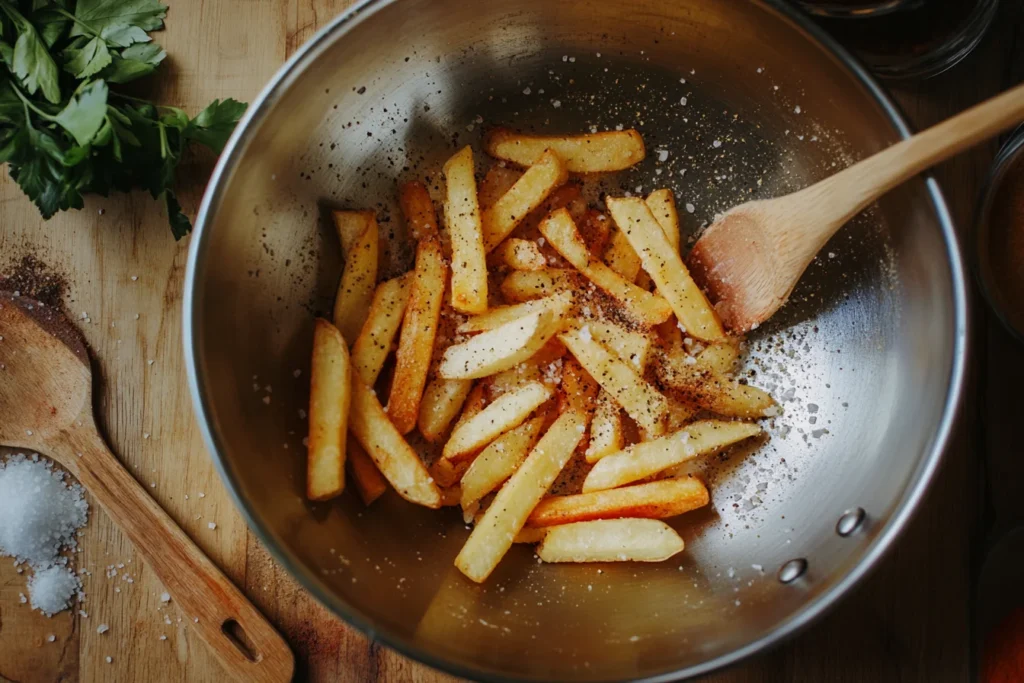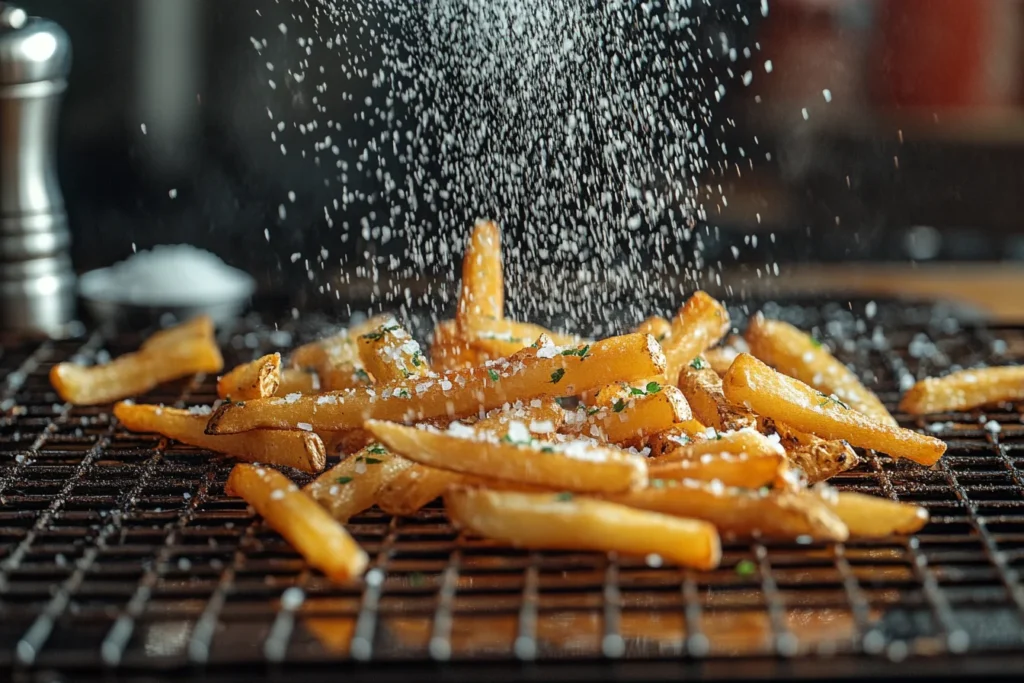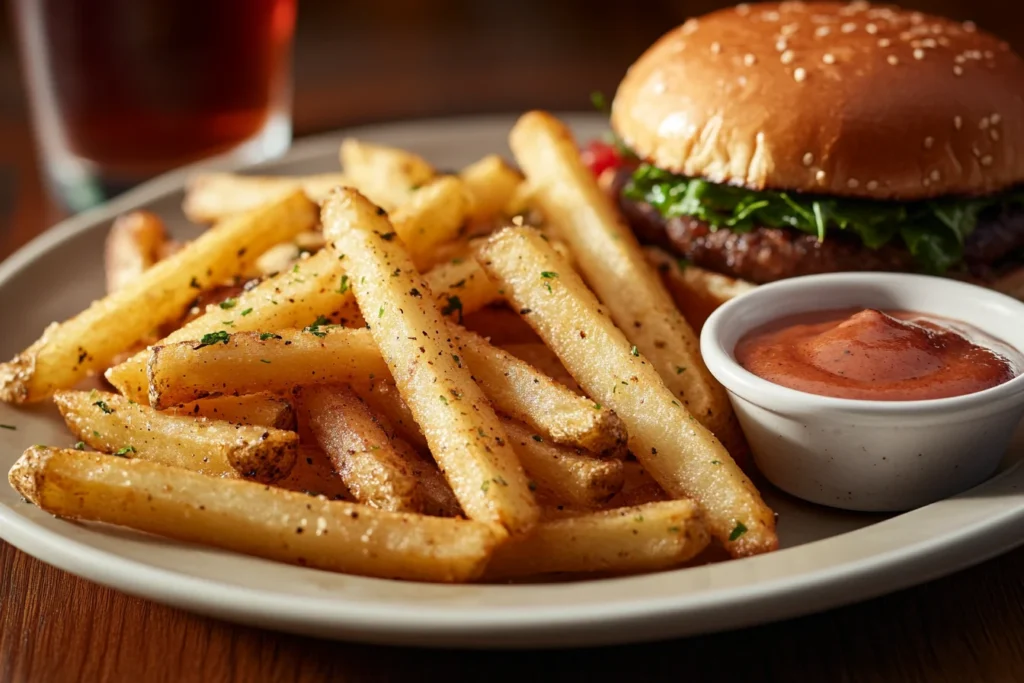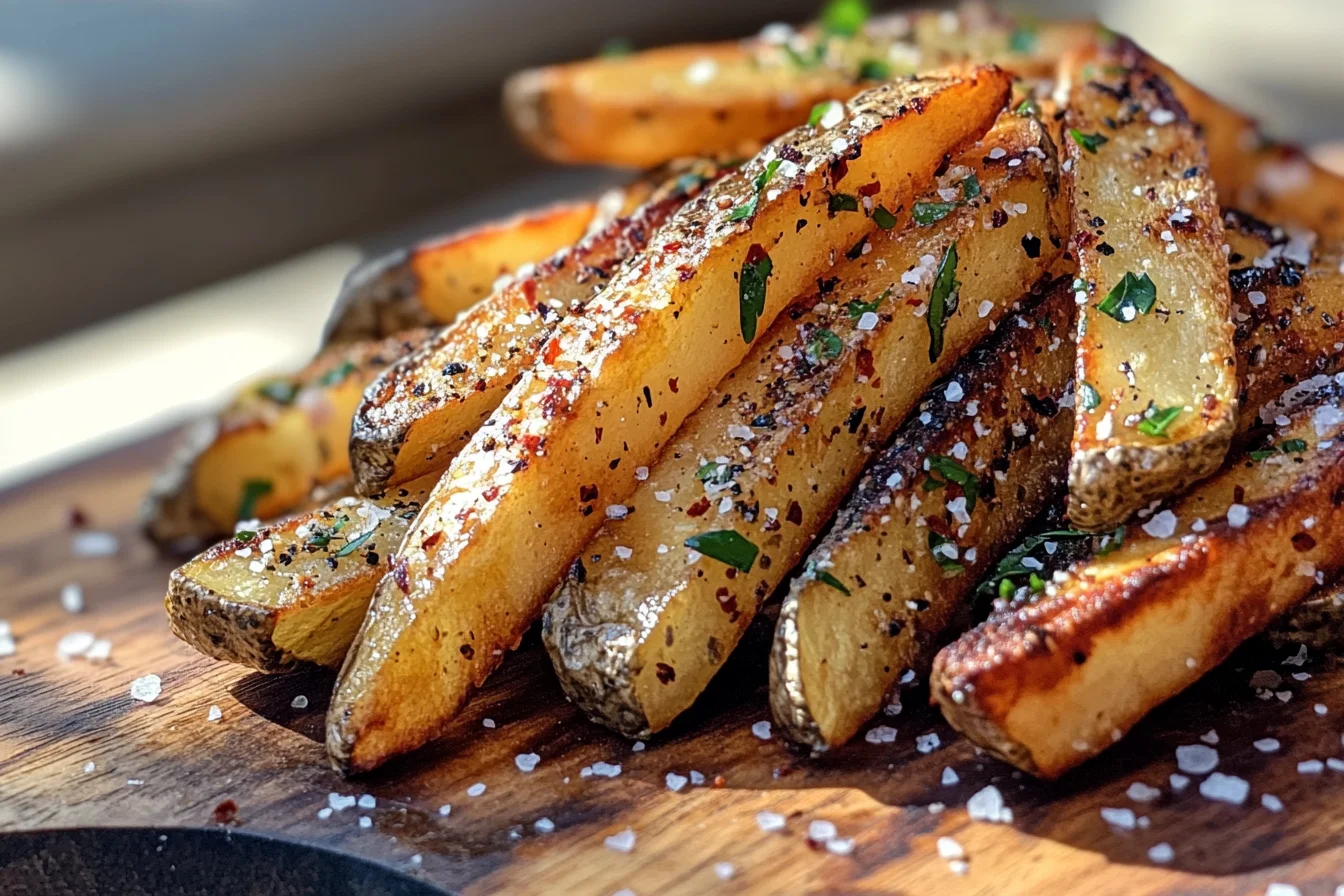Table of contents
Ah, French fries! Those crispy, golden sticks of potato perfection that are a staple in so many of our lives. Whether you’re enjoying them as a side to a burger, dipping them in your favorite sauce, or just munching on them solo, there’s no denying that a good batch of fries can truly hit the spot. But the million-dollar question is: when should you season French fries? Is it before they hit the fryer, as soon as they come out, or somewhere in between? This is the fry-tastic debate we’ll tackle today, so grab your favorite seasoning, and let’s get to the bottom of this, shall we?
The Timing Tussle: Pre-Fry, Post-Fry, or Both?
There’s no single right answer to the “when should you season fries” dilemma. The truth is, it all depends on what kind of flavor and texture you’re aiming for, and also on your personal preference. Each method has its own advantages and disadvantages, and also affects the final results. Seasoning before frying can embed flavors deep within the potato, while seasoning after can deliver a more immediate punch. Similarly, some people prefer to add it in different stages, depending on what the desired outcome is. So, let’s break down each approach to discover the best time for seasoning fries, shall we? In addition, we will explore all the different factors that can influence the timing of seasoning.
Seasoning French Fries Before Frying: The Pros and Cons
Seasoning before frying involves adding salt, spices, and/or herbs directly to the raw potatoes, before they go into the hot oil or air fryer. This method is ideal for those who want deeper, more embedded flavors. Also, it’s one of the ways that people achieve a certain type of texture and taste.
The Upsides:
- Deeper Infusion: When seasonings are applied before frying, the heat and the fat help to infuse the flavors into the potato, giving a more consistent flavor throughout.
- Enhanced Color: Some seasonings, like paprika or garlic powder, can contribute to the color of the fries, making them more visually appealing.
- Better Adhesion: The seasonings tend to stick better to the potato’s surface when applied before frying, and will stay put in the final product. Therefore, this method helps to keep the seasoning in place.
The Downsides:
- Potential for Burning: Some spices can burn in hot oil, leading to a bitter or acrid taste. Consequently, it is important to choose the type of spices carefully.
- Uneven Distribution: It can be challenging to ensure that all the fries are evenly coated with the seasoning.
- Limited Control: You have less control over the final flavor, because the seasoning’s impact can be altered by the frying process itself.
Seasoning French Fries After Frying: The Pros and Cons
Seasoning after frying means applying your salt and spices to the fries as soon as they’re removed from the fryer. This method is favored for its simplicity and immediate flavor impact. Not only that, but this can be the perfect option for some people.
The Upsides:
- Immediate Flavor Punch: The seasoning sits on the surface of the fry, delivering a strong and noticeable flavor.
- Better Control: You can easily adjust the amount and type of seasoning after frying, giving more control over the final result.
- No Risk of Burning: There is no risk of burning your spices, as they are added after the heat.
The Downsides:
- Uneven Adhesion: The seasoning may not adhere as well to the fries, especially if they’re not hot or slightly moist.
- Surface Flavor: The flavor tends to be more superficial, sitting only on the surface of the fries and not deeper into the potato itself.
- Potential for Clumping: If the fries are too wet or oily, the salt can clump together and not distribute evenly.
The Hybrid Approach: Seasoning Before AND After
For those who can’t choose, there’s a hybrid method: seasoning both before and after. This method combines the benefits of both approaches. Also, this method can lead to some amazing results.
The Upsides:
- Deep and Immediate Flavor: This method results in the most complex flavor profile, with flavors both infused into the potato and sitting on the surface.
- Better Adhesion: Seasoning before creates a base for other seasonings to stick to, when seasoning is also done after.
- Enhanced Color and Texture: This technique can provide the best results for texture and color in the fries.
The Downsides:
- More Steps: This method requires a bit more time and effort, involving two separate seasoning steps.
- Potential for Over-Seasoning: You need to be careful not to over-season the fries, as you are seasoning twice.
- Requires More Planning: This method requires more planning and can seem more complicated than either of the single methods. However, with time and practice it can become second nature.
Step-by-Step Guide: How to Season French Fries Perfectly
Okay, let’s get to the practical part. Here’s a step-by-step guide on how to season your fries, utilizing the three different methods: Above all, make sure to follow each of the steps closely.
Seasoning Before Frying:
- Prep Your Fries: Cut your potatoes into fries.
- Season: In a large bowl, toss the raw fries with salt, spices, and any herbs you’d like.
- Fry: Fry the fries according to your preferred method.
- Serve: Remove from the fryer and serve immediately.

Seasoning After Frying:
- Fry: Fry the fries according to your preferred method.
- Drain: Remove the fries from the fryer and place them on a wire rack or paper towel to remove the excess oil.
- Season: While the fries are still hot, season them generously with salt and any other seasonings you’d like.
- Toss: Gently toss the fries to make sure that the seasonings are evenly distributed.
- Serve: Serve immediately.

Before AND After:
- Prep Your Fries: Cut your potatoes into fries.
- Season (First Time): Toss the raw fries with some salt, and spices, and any herbs you’d like.
- Fry: Fry the fries according to your preferred method.
- Drain: Remove the fries from the fryer and place them on a wire rack or paper towel to remove the excess oil.
- Season (Second Time): While the fries are still hot, season them again with more salt and any other seasoning you like.
- Toss: Gently toss to evenly distribute the seasonings.
- Serve: Serve immediately.
Choosing the Right Seasoning for Your French Fries
The type of seasoning you use is just as important as when you use it. Here are some classic options that complement French fries: Also, consider these options as a base for your creativity, and feel free to experiment.
- Salt: The most essential seasoning, essential for flavor. Both sea salt or kosher salt work perfectly.
- Black Pepper: Adds a bit of spice and depth. Use freshly cracked black pepper for best results.
- Garlic Powder: For that savory umami punch.
- Onion Powder: Adds a subtle sweetness and another layer of flavor.
- Paprika: For a subtle smokiness and enhanced color.
- Cayenne Pepper: A touch of heat if that is what you like.
- Herbs: Dried herbs such as rosemary, thyme, or oregano can also be delicious. Therefore, you can choose any herb you like.
The Science Behind Seasoning: Why Timing Matters
The timing of seasoning affects the taste and texture of your French fries due to the principles of osmosis and heat transfer. When salt is applied to raw potatoes, it draws out moisture through osmosis, potentially making the fries less crispy, if not dried correctly before frying. However, if it’s added after frying, it sits on the surface, creating a concentrated flavor. Similarly, heat helps to release volatile flavor molecules, and also helps to fuse the flavors with the potatoes, when added pre-fry. Therefore, the timing does play a crucial role in the final result. In addition, understanding the science behind it, can help you have a better appreciation of the dish.
The Impact of Different Frying Methods on Seasoning
It’s worth noting that the frying method you use can also impact how seasoning behaves. Deep frying usually allows the seasoning to adhere more evenly, thanks to the uniform heat. However, air frying might require a bit of oil to help the seasonings stick better. Similarly, baking can lead to some burning if the seasoning is applied before, so it’s best to season after. Therefore, you should keep the cooking method in mind, while considering the seasoning process.
Also, when using different oils to cook the fries, the taste will be affected. Each oil imparts its own flavor profile to the final product. Therefore, choosing the correct oil is also very important for great tasting fries.
Answering Your Burning Questions About Seasoning French Fries
Now, let’s address some frequently asked questions about seasoning French fries, as often found in Google’s “People also ask” section: Even though it may seem simple, some common questions come up, and we are here to address them.
Q: Can I use seasoned salt?
A: Yes, you can use seasoned salt, but keep in mind that some seasoned salts can have a high salt content. Taste as you go.
Q: What if I’m using an air fryer?
A: The same principles apply to air-fried fries. You can season before, after, or both, depending on your preference. Consequently, you can apply all the methods discussed above.
Q: Can I use fresh herbs instead of dried herbs?
A: Yes, you can use fresh herbs. However, add them after frying to preserve their flavor. Earlier, we mentioned that fresh herbs lose their flavor when they are exposed to heat.
Q: Should I use oil when seasoning before frying?
A: It’s not necessary to use oil when seasoning before frying, but a little bit can help the seasonings adhere better to the potatoes.
Q: What if my fries are already salted?
A: If your fries are pre-salted, it’s best to skip seasoning before frying, and only add more after, if necessary.
Q: How do I make sure the seasoning sticks to my fries?
A: For best results, make sure the fries are hot, and slightly moist, before applying the seasoning. You can also toss the fries in a little oil before seasoning. Also, make sure that they have been drained correctly.
Beyond the Basics: Experimenting with Unique Seasoning
While salt, pepper, and garlic powder are all great options, you can also go beyond the basics and try some more unique seasonings for your French fries. For example, you can try some parmesan cheese, truffle oil, or even some smoky flavors. The possibilities are endless, therefore do not be afraid to try new things and experiment. Not only that, but consider the meal that you will be serving the fries with, as that can give you a good point to start with.
The Perfect Fry is in Your Hands
There is truly no right or wrong answer to this great debate. The best way to determine when to season fries is to experiment with all three methods, and different types of seasoning. The perfect fry is one that YOU enjoy the most, therefore you should play around until you get it right. The final taste of the fry will depend on your preferences, so do not be afraid to explore and find what works best for you. Similarly, keep trying different options until you get exactly what you want.

In Conclusion: Seasoning French Fries Your Way
The question of “when should you season French fries?” is really all about personal preference. There is no one single correct way, but many different ways you can apply your seasoning and achieve amazing results. Whether you’re a fan of deep, infused flavors, a fan of a strong, immediate flavor punch, or prefer a combination of both, the secret is to experiment, and see what you like best. So, go ahead, grab your potatoes, your favorite seasonings, and create your perfect batch of French fries. Happy frying! Finally, I hope that this has provided you with the information you were looking for.


